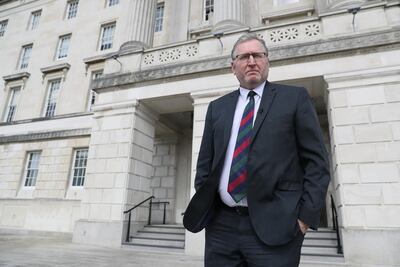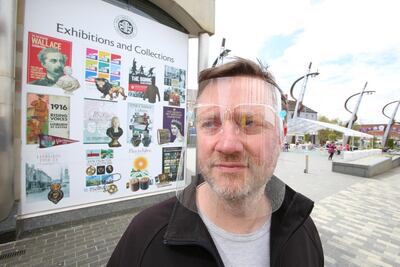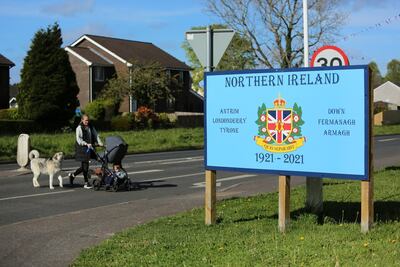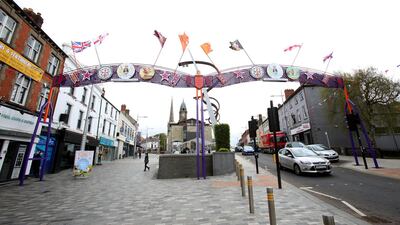Alana Cahoon is highly engaged with the political scene in Northern Ireland and hopeful for a fresh start when new leaders are chosen for its unionist parties in the coming weeks.
That is despite the forthcoming departure of the high-profile student campaigner and fledgling unionist party member from her birthplace to a new life at university in Scotland in September.
Ms Cahoon's situation is not an untypical experience over the 100 years of Northern Ireland’s existence but goes to the heart of why its centenary celebrations are a very muted affair.
News bulletins this week were dominated by talk of the "crisis of unionism”. At the very moment that Northern Ireland reached its landmark anniversary, the unionist tradition that drove its creation is widely seen as rudderless. Two unionist political leaders stepped down to make way for new blood.
The largest party, the Democratic Unionists, will choose a new leader on Friday after a snap contest when Arlene Foster, Northern Ireland's first minister in the devolved administration, was forced to quit. Edwin Poots, the traditionalist-leaning agriculture minister, is going up against Sir Jeffrey Donaldson, the leader of the group in Westminster.

War hero Doug Beattie, who has the highest honour, a Military Cross, for his bravery in battle in Garmsir in Afghanistan in 2005, has thrown his hat into the ring for the top job in the Ulster Unionist Party, which founded Northern Ireland in 1921 but has been lately overshadowed by its DUP rivals.
Ms Cahoon has joined the Ulster Unionists and hopes that her paperwork is processed in time to support Mr Beattie, who is well known as a moderate on the divided local scene.
Asked about the symbolic importance of the vacuum just as the centenary was being marked, she hopes for new beginnings. "I see it as a silver lining," she told The National. "There is a generation more liberal in social issues and they want a unionist party to support them in delivering those conditions.
"They have lost faith in the DUP and politics that is about Us and Them. For example, can we be open to discourse about the Irish language without making disapproving noises?"
After 30 years of fighting in the Troubles, Northern Ireland got a chance for a fresh start with cross-religious governments set up under the 1998 Good Friday Agreement. The unionist parties have always led those governments but the movement faces disillusionment because of the infighting and ineffectiveness of successive administrations.
Criticism of Sinn Fein, the Republican party that dominates the Catholic vote, is strong, too, but the crisis has hit the unionists harder.
The spark for the latest round of political turmoil is the 2016 Brexit referendum that pulled the UK out of the European Union. The EU is a pillar of the Good Friday Agreement, and the Republic of Ireland remains a member of the bloc.
To complete its withdrawal at the end of last year, London agreed to a protocol with Brussels that keeps Northern Ireland in the EU's single market. That has meant checks on goods between the mainland and Northern Ireland, and triggered a backlash including street protests in Unionist areas.
Jim Wells, another member of the assembly which sits in the vast Portland Stone Stormont buildings, is a supporter of Mr Poots in the low-key battle with Mr Donaldson. With a new leader, he believes the DUP should take all the way its fight to scrap the protocol on trade, which is hated by the party's core supporters.
"Edwin Poots is the candidate most likely to take the party forward by restoring its basic principles, to fight for Northern Ireland and its citizens," Mr Wells tells The National. "There is no upside, the protocol is toxic. The protocol has the potential to create a united Ireland built into it."
A turn to reflect the hearth and home values of loyal supporters is, to Mr Wells, what is needed from the new leadership and an area where he faults Ms Foster for not always following these instincts.
"Is it wrong to say that a happy family life is a fundamental building block of society?" he asked after rebels ousted Ms Foster for breaking with conservatives in a recent vote.
Having no truck with the narrative of reconciliation is something that goes down well in the DUP. While the demographics of Northern Ireland show that Catholics are moving from minority to majority - in part because the brain drain hits Protestant towns hardest - many calculate that there is a soft group of nationalists who would opt to stay in the UK.

"There’s a saying here that everybody wants to go to heaven but no one would choose to die next Tuesday," says the church-going Mr Wells. "There are a lot of people who are nationalists by ethos but when the crunch comes they are not going to vote to leave the UK."
Mr Poots and Mr Donaldson share a constituency office in a handsome Georgian mansion in the staunchly loyalist town of Lisburn.
While there is pride in the local representatives dominating the race for high office, Lisburn businessman John McWhinney is unsettled by the re-emergence of the clashes on the streets that many fear will spill over into a hot summer of violence.
Where Mr McWhinney lives, there is a need to take precautions on Friday nights. "There are protests every week, the businesses are closing early and I know to move my car," he says. "The people in the demonstrations are not in uniform and wear masks but you can see they’ve been mobilised.
"There is an atmosphere and it’s designed to be antagonising. Everybody is meant to know it - it’s a show of force."

Local DUP councillor Scott Carson believes that the party must remain in touch with the frustrations among its supporters. The idea of shift to more liberal political strains among the young can be overdone. The hunger for strong leadership lies across the age groups.
"There are plenty of people who didn’t grow up with the Troubles who want a leader committed to Unionist principles and can make a positive case for continuing to have a place within the UK," he said. "As a leader, it’s important to listen to the grass roots."
John Manley, a journalist for the Irish News, was in regular contact with Ms Foster throughout her tenure as DUP leader and for him her demise represents a probable shift to harder-line politics.
"The battle for unionism is taking place on the right and, having scapegoated Arlene Foster for Brexit and the protocol, the DUP is pushing the party to a more gung-ho position," he said.
While the town of Lisburn and other strongholds have mounted centenary arches to celebrate the establishment of the Protestant dominated state, the irony is that the jockeying for power has hogged the headlines.

"They have managed to eclipse the whole centenary with their shenanigans," observes Mr Manley.
Ms Cahoon's entry into political life dates back to the pandemic decision to scrap A-level exams during the first wave last year. When the DUP education minister declared he had consulted all the relevant stakeholders ahead of time, she cried foul that the pupils involved had not been given a voice.
She helped found the Secondary Students' Union of Northern Ireland and soon found herself in the spotlight talking about challenges facing the youth, such as mental health.
Unlike many of her generation, Ms Cahoon has not been tempted by the rise of the cross-community Alliance Party, which is posited between those loyal to the UK and the Nationalists/Republicans that want a whole of Ireland country established on the island.
Instead, she wants her own unionist representatives to have answers to the strains in society. "Young people are falling between the cracks," she says. "Yet the politicians focus on issues like flags and language rights - it’s no wonder many people are giving up."

For Ms Cahoon, a place at Strathclyde University in Scotland waits in September. The journey to Great Britain for study is one made every year by students from Northern Ireland. The brain drain means many never go back.
"There’s a whole university, 17,500, that's left here to study elsewhere," she said.
The unchanging political basis of society is one of the factors driving her out for now. "I don’t want to go to university in Belfast and be branded by where I’m from," she says.
"The estate I am living in has a huge loyalist mural and people will assume I am part of that just from talking to me and asking the right questions."



